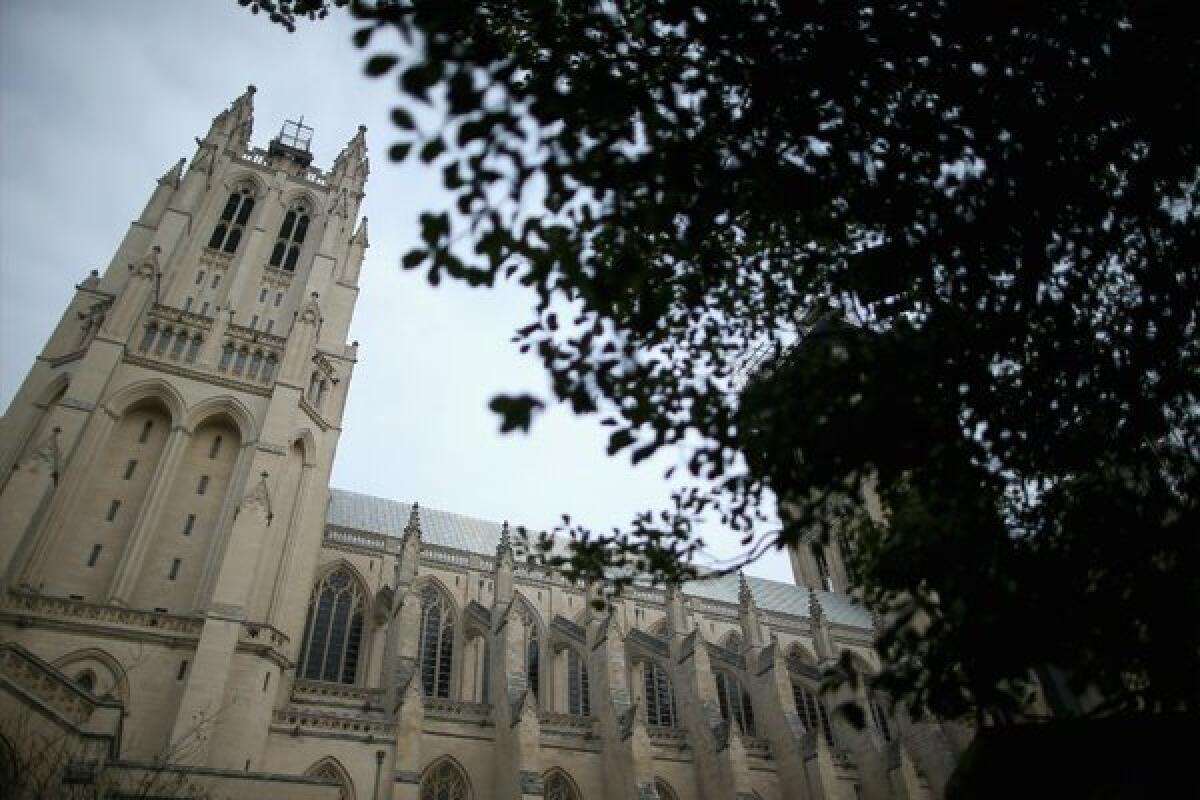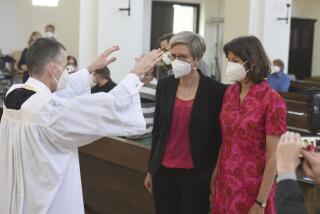Washington National Cathedral says yes to same-sex marriages

- Share via
Supporters of gay marriage are exultant that the Washington National Cathedral has announced that it will perform same-sex weddings. It’s not really a surprise. The Episcopal Church to which the cathedral belongs approved a rite for same-sex blessings in 2012 and same-sex marriage is legal in the District of Columbia.
So why all the breathless coverage of the announcement? It has to do with the “national” in the popular name of the church (which is officially called the Cathedral of St. Peter and St. Paul) and its status as a quasi-public institution.
The Associated Press report about the announcement began this way: “The Washington National Cathedral, where the nation gathers to mourn tragedies and celebrate new presidents, will soon begin hosting same-sex marriages.” This is only slightly less grandiose than the description of the cathedral on its website: “The cathedral is a spiritual resource for our nation: a great and beautiful edifice in the city of Washington, an indispensable ministry for people of all faiths and perspectives, and a sacred place for our country in times of celebration, crisis, and sorrow.”
TIMELINE: Gay marriage chronology
This description is controversial with at least two groups. One consists of non-Episcopalians who consider it presumptuous that a church of a particular denomination — and one long associated with moneyed elites — should portray itself as representing the entire nation. (Roman Catholics would point out that John F. Kennedy’s funeral was held at St. Matthew’s Cathedral, as was the memorial service for Chief Justice William H. Rehnquist, a Lutheran.)
Then there are secularists who object to the notion that any church should aspire (as it were) to the status of a national institution. In 2011 the mayor of Washington proposed that the Federal Emergency Management Agency help underwrite repairs to the cathedral after the East Coast earthquake. Americans United for Separation of Church and State huffed: “Asking the taxpayers to pick up the tab sets a very bad precedent and jeopardizes a critically important edifice that protects us all: the wall of separation between church and state.” (The cathedral withdrew its application for assistance after studying FEMA guidelines barring direct aid to religious institutions.)
But a cathedral official was right when he told the Los Angeles Times last year that “we are a whole lot more than just a church.” Although the foundation that runs the cathedral received a charter from Congress in 1893, the church isn’t an instrumentality of the government. Still, it has established itself as a civic institution that presides over political rites of passage, from presidential funerals to the prayer service after the 9/11 attacks at which President George W. Bush spoke.
The cathedral’s decision to perform same-sex weddings won’t have any direct effect on decisions by Congress or the Supreme Court. But the “wall of separation” invoked by Americans United has always been a porous one, and the approbation for gay couples shown by the cathedral could seep through to influence Washington’s secular precincts. Supporters of same-sex marriage are right to see this decision as a cultural and political blessing, not just a religious one.
ALSO:
Huell Howser: ‘The real deal,’ on and off camera
‘Something extra came out.’ And it is too late for Al Roker
More to Read
A cure for the common opinion
Get thought-provoking perspectives with our weekly newsletter.
You may occasionally receive promotional content from the Los Angeles Times.







